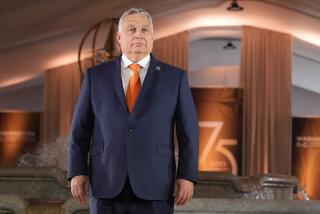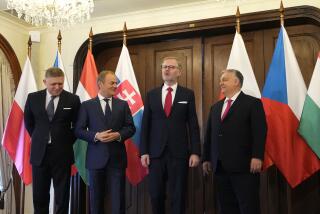Czechs to Open Diplomatic Ties With Lithuania : Baltics: But Prague’s planned office in Vilnius may not have status of an embassy. Similar step by Iceland angered Soviets.
- Share via
VISEGRAD, Hungary — Czechoslovakia will establish direct diplomatic ties with Lithuania because it “supports the legal parliaments and governments of the Baltic republics,” President Vaclav Havel announced Friday.
Czechoslovakia is only the second country to move toward recognition of Lithuanian sovereignty, following Iceland’s declaration earlier this week.
The Kremlin, angered by Iceland’s overture to Lithuania, on Thursday recalled the Soviet ambassador from Reykjavik.
Havel, in Hungary to attend a summit meeting of Eastern Europe’s three leading reform states, said the decision to open a diplomatic representation independent of Prague’s embassy in Moscow was prompted by “the latest developments in the Soviet Union.”
The former dissident who rose to power during Czechoslovakia’s “Velvet Revolution” was cautious in his remarks about recent Soviet events. He seemed to deliberately avoid referring to the planned Vilnius office as an embassy, instead calling it a “representation” of the Foreign Ministry.
The former Communist states of Eastern Europe have been disturbed by what appears to be a hard-line resurgence in the Soviet Union. Moscow has used armed force to harass national independence movements in Lithuania and Latvia, and new curbs on the media have called President Mikhail S. Gorbachev’s policies of perestroika (restructuring) and glasnost (openness) into question.
Lithuanian President Vytautas Landsbergis had sent a letter to the leaders of Hungary, Czechoslovakia and Poland asking that conditions in the Baltic area be discussed during their Visegrad conference, Havel said.
The Czechoslovak president took a bolder step toward aiding the Baltic states than the other participants.
Hungarian Prime Minister Jozsef Antall hinted that some upgrading of relations with the Baltic republics might be in store, but he stopped short of matching Havel’s pronouncement.
“Hungary also appreciates the right to self-determination of the Lithuanian nation and that of other nations and maintains contacts with them,” Antall said, noting that Hungarian parliamentary commissions have direct ties to counterparts in Vilnius. “We also endeavor to establish other forms of diplomatic collaboration.”
Polish President Lech Walesa expressed support for Baltic autonomy but suggested that Poland will continue to deal with Lithuania through the informal channels already established.
Havel gave no indication of when the new Lithuanian representation would be opened. Nor did he say whether the office might differ in status from a full-scale embassy.
“We decided to do this so that the representation is not subordinated to our embassy in Moscow,” Havel replied when asked if the move was tantamount to recognizing Lithuanian sovereignty.
Havel traveled to this ancient fortress city overlooking the Danube River for a meeting with Hungarian and Polish leaders to consider new relations and cooperation in post-Communist Eastern Europe.
The statesmen issued a joint appeal for “the soonest conclusion to the war in the (Persian) Gulf” but offered no specific proposals for ending the hostilities.
Although the session produced little more than a statement of intent to aid one another in overcoming socialism, it served as an example of the emerging north-south divide that has opened up in Eastern Europe since democratic revolutions drove out Communist dictators.
Hungary, Poland and Czechoslovakia have been meeting regularly to devise new defense and trade arrangements.
A constant state of crisis in Romania and Bulgaria has slowed reform and recovery in the Balkans, prompting their neighbors to the north to leave them behind in the regionwide quest for integration with Western Europe.
The Visegrad partners repeatedly insisted that other states in Eastern Europe have nothing to fear from their loose alliance but made clear that it was an exclusive club of three.
“We do not wish to expand” the forum, Antall said when asked about possible resuscitation of the Comecon trade bloc or military cooperation with other former allies.
Leaders of the disintegrating Warsaw Pact are to convene in Budapest on Feb. 25 to dismantle what little is left of their military alliance.
More to Read
Sign up for Essential California
The most important California stories and recommendations in your inbox every morning.
You may occasionally receive promotional content from the Los Angeles Times.














